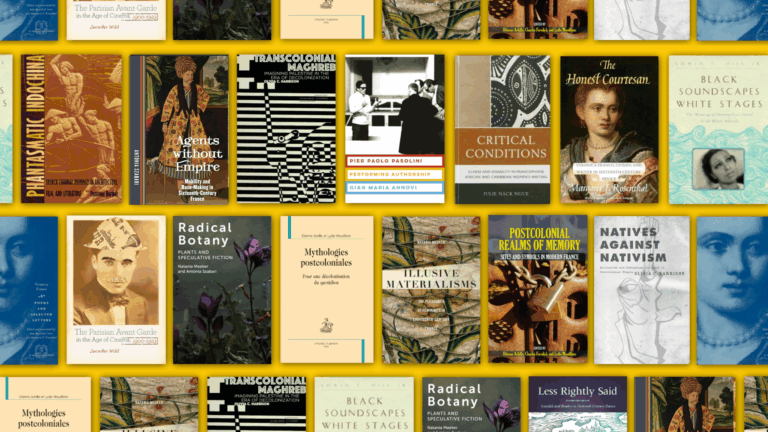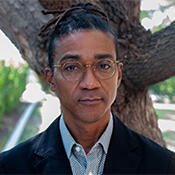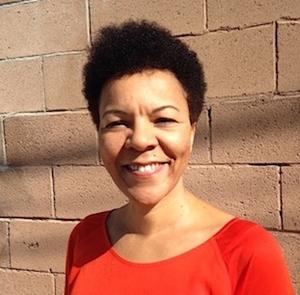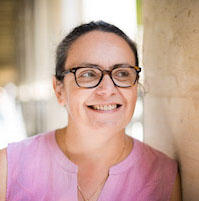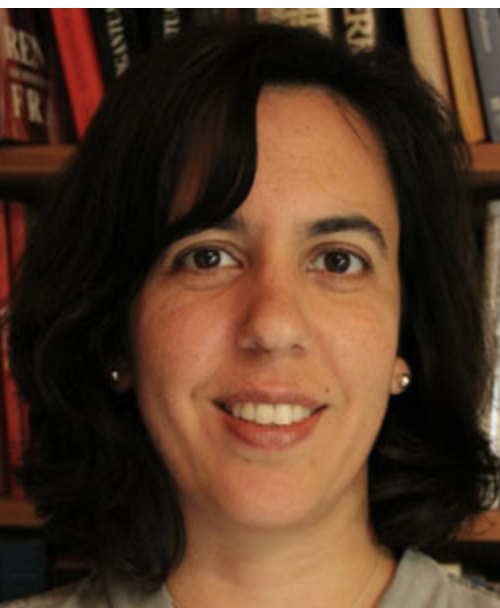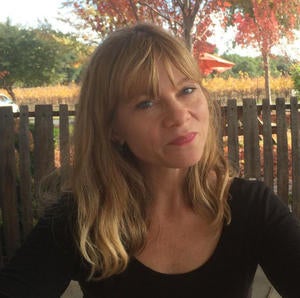Core Faculty
Professor of French and Italian, Comparative Literature, Middle East Studies and American Studies & Ethnicity
Olivia C. Harrison’s research focuses on postcolonial North African, Middle Eastern, and French literature and film, with a particular emphasis on transcolonial affiliations between writers and intellectuals from the Global South. Her publications include Natives against Nativism: Antiracism and Indigenous Critique in Postcolonial France (University of Minnesota Press, 2023), Transcolonial Maghreb: Imagining Palestine in the Era of Decolonization (Stanford University Press, 2016), and essays on Maghrebi literature, Beur and banlieue cultural production, and postcolonial theory. With Teresa Villa-Ignacio, she is the editor of Souffles-Anfas: A Critical Anthology from the Moroccan Journal of Culture and Politics (Stanford University Press, 2016) and translator of Hocine Tandjaoui’s proem, Clamor/Clameur (Litmus Press, 2021). She is currently working on a book project titled The White Minority, which tracks the settler colonial genealogies of nativism and anti-immigrant discourse in France.
Keywords: Maghreb; Palestine; Beur and banlieue literature and film; decolonization; transcolonial studies; global south studies; settler colonial and indigenous studies; racism and antiracism; translation
Courses: “Translating Race”; “France and Islam”; “Third World Documents”
Associate Professor of French and Italian and American Studies and Ethnicity
My research lies at the intersections of popular music and literature, with a focus on histories of race and modernity, theories of sound, post/colonialism and black feminist thought, black Atlantic and Mediterranean noir fiction, and popular musical forms and cultural practices (jazz, hip hop, and house). I published my book Black Soundscapes White Stages: The Meaning of Francophone Sound in the Black Atlantic by Johns Hopkins University Press (African diaspora series, 2013). Published articles appear in Ethnomusicology Forum, the Journal of Popular Music Studies, and Negritud: Journal of Afro-Latin American Studies. My book-in-progress deals with black rage and sound cultures in France and the US. Courses taught: “Modernités noires: Afro-modernism, Blackness, and Le Noir”; “The Soundtracks of Our Lives: Sound, Power, and Technology”; “Global Ciphers: Hip Hop Circles Around the World.”
Keywords: popular music; black radicalism; black Atlantic literature; theories of race; modernity; post/colonialism; detective and noir fiction.
Professor of French and Comparative Literature
My research and teaching interests include materialisms, old and new, the literature and philosophy of the eighteenth century, the history of gender and sexuality, and plants in all of their practical, conceptual, and affective ramifications. I recently completed a book entitled Illusive Materialisms: The Pleasures of Femininity in Eighteenth-Century France (Fordham UP, 2025) and I am the coauthor, with Antónia Szabari, of Radical Botany: Plants and Speculative Fiction from Early to Late Modernity (Fordham UP, 2020). My 2006 book, Voluptuous Philosophy: Literary Materialism in the French Enlightenment, was also published with Fordham. My work cuts across periods and methodologies, incorporating my longstanding interest in feminist and queer studies. I am coeditor, with Jean O’Barr and Eugenia C. DeLamotte, of the anthology Women Imagine Change: A Global Anthology of Women’s Resistance, 600 B.C.E. to the Present (Routledge, 1997). I have a particular attachment to collaboration in practice and in theory, and I enjoy teaching at all levels. My new research involves plants and the history of sexuality, especially as parsed through social movements of the eighteenth and nineteenth centuries, and the work and life of the critic Frances Wright (1795-1852).
Keywords: radical botany; vegetal ontology; materialisms; feminisms, gender, and sexuality; libertine literature; Enlightenment; Epicureanism.
Courses: “Theory Matters”; “Femmes philosophes, femmes révolutionnaires”; “Imagining Other Worlds.”
Chair of the Department of French and Italian
Marion Frances Chevalier Professor of French. and Professor American Studies and Ethnicity
My research explores literatures and arts from France and the Francophone Global South, with specific inquiries into issues of race and representation in national and transnational contexts. My recent book, Mythologies Postcoloniales, is a Barthes-inspired study of colonial signs and racialized myths in 21st-century France (co-authored with E. Achille, Editions Champions, 2018). In progress is a multi-contributor volume documenting physical and immaterial traces of Empire in the French Republic, entitled Postcolonial Realms of Memory, to be published by Liverpool University Press.
Keywords: Caribbean literature; Francophone Africa; Popular Culture; Frenchness and Race; Authorship; 2oth and 21st Century fiction; French Atlantic cultural history and representations.
Courses: “Postcolonial Theory: The Francophone Context”; “Representing Africa”; “War, Fiction and the Postcolonial”; “What is a postcolonial author?.”
Associate Professor of French and Italian and Comparative Literature
My areas of research and teaching interests include postcolonial theory, contemporary Francophone and French studies, and Francophone, French, and Southeast Asian cinema; comparative media, the documentary and essay film. I am the author of Phantasmatic Indochina: French Colonial Ideology in Architecture, Film, and Literature (Duke UP, 1996) and currently completing a book manuscript entitled (Post)Colonial Screens.
Keywords: Comparative media, Contemporary French Studies, Francophone theory, French and Southeast Asian cinema.
Courses: “The Art of War,” “Modernités,” “The French New Wave” “Southeast Asian Cinemas.”
Jennifer J. Wild specializes in French cinema and visual culture; the history and theory of modernism and the avant-garde; political aesthetics; and historiography. Her first book, The Parisian Avant-Garde in the Age of Cinema, 1900-1923 (The University of California Press, 2015; short-listed, Kraszna-Krausz Best Moving Image Book Award, 2016; Honorary Mention, Wylie Prize in French Cultural Studies, 2014-15), explores how the early cinema experience, rather than films alone, was a key component in the development of early twentieth-century modern and avant-garde art including Cubist and abstract painting, and Dada’s radical manner of reimagining art and its experience for the masses. By using a historical, archival approach to explore theoretical, formal, and conceptual questions related to the historical cinema experience, Wild’s book offers an anti-patriarchal and anti-canonical account of avant-gardism and early cinema in Paris, identifying them as mutually inclusive frameworks for radical spectatorship, aesthetic reception, and modernist form. She is currently completing a second book: Radical Recognition: Photography, Film, and History in the Image studies the political aesthetics of the mechanically reproduced image as it was deployed by the French and Belgian avant-garde across the twentieth century to query the image’s potential liberation from structural systems of signification in what Wild calls “technological secularism.”
Keywords: the European historical avant-garde, modernism, visual and material culture, cinema history, historical film exhibition and experience, aesthetic reception, political aesthetics
Teaching Faculty
Lecturer
Rania Ben Amor received her M.A from Paris Sorbonne University in French Literature and an M.A from Boston College in French Language and Gender Studies. Her interests and research engage in implementing literature, virtual reality, gender studies into foreign language acquisition classroom, and fostering communicative and cultural competencies. She is also the founder of Association de la Francophonie where she organizes cultural events within the department and beyond.
Master Lecturer
Nathalie Burle received her Master of Science and her Doctorate in Learning and Instruction with a specialization in Second Language Acquisition and Applied Linguistics from the Rossier School of Education. She also holds a French Maitrise (M.A) in Foreign Languages and Letters from Universite de Provence in Aix-en-Provence, France. Her research focuses on Cognitive Cultural Studies, Second Language Acquisition, Applied Linguistics, Educational Psychology and Curriculum.
Master Lecturer
Julia Chamberlin has been teaching French at USC since 2004. Her interests include second language acquisition and language assessment. Her courses focus on bringing authentic materials into the classroom to further second language acquisition and cultural competency. As coordinator of French 120, Julia is responsible for curriculum development as well as the training of new Assistant Lecturers.
Assistant Professor (Teaching) of French
Jennifer Misran is a full-time Assistant Professor of French (Teaching) in the Department of French and Italian, where she has been teaching in the Basic Language Program since 2016. She also serves as Director of the Maymester Program in Martinique. She earned her Ph.D. in French and Francophone Literature from the University of Wisconsin–Madison. Her research focuses on Francophone African and Caribbean literature, particularly questions of identity and its interconnection with space. More recently, her work has expanded to include Caribbean approaches to ecocriticism, ecocide, and ecopoetics, examining how literature’s poetic engagement with nature influences imagination and sensibility. She has also developed an interest in the figure of the female criminal and its representation in popular culture. Alongside her research, she is dedicated to advancing the intersections of literature and language pedagogy across all levels of proficiency.
Professor (Teaching) of French
As a biographer (four published, Valery Larbaud, Max Jacob, Philippe Soupault and Susan Sontag (2017)), I am interested in life-writing studies, as well as intellectual history, which includes history of publishing. In the recent years, I have published on those topics as well as Francophone literature, with a focus on Algerian literature and history, and Kabyle immigration in France. While researching for a new biography, I am also working on a monograph on the life and experiences of early Kabyle Muslim immigrants in France between the two wars.
Research: life-writing; biography studies; history of publishing; francophone literature and culture; France; twentieth century literature; twentieth-first century literature; colonial studies; post-colonial studies
Master Lecturer
Atiyeh Showrai has been teaching French at USC since 1995. She is currently director of the French language program and director of the Chambre de Commerce et d’Industrie de Paris Région Ile-de-France examination center at USC. She is also an ACTFL tester and WPT rater with full certification. Her pedagogical focus is on standards based language instruction at all levels, including Creative Writing, Business French, and Legal French. Her courses integrate the use of simulations and content-based instruction using authentic multimedia materials. Her scholarly interests include French for specific purposes, second language acquisition, teaching methodology, and language assessment.
Keywords: Business French, Legal French, creative writing, second language acquisition, assessment, simulations, French for specific purposes
Associate Professor (Teaching) of French
Guilan Siassi has been on the USC faculty since 2012. In addition to teaching in the French basic language program, she also teaches a French 250 course on the theme of “France and its Others” and a general education class on transnational haunting in world literature. Her research engages modern literatures in French, Persian, and English, with a focus on the cultures of the Maghreb, Iran, and their diasporas in France and North America. She has presented and published on a range of topics related to her broader research interests, which include North African literature, women and Islam, psychoanalytic and social theory, translation studies, autobiography, and issues of exile and transculturation. She has been working with the USC Middle East Studies Department on interdisciplinary events and programming since 2015 and is currently serving on the Advisory Board for the Persian Academic and Cultural Student Association.
Keywords: postcolonial literature and film; MENA region; psychoanalysis; the uncanny; ghosts of history; memory and forgetting; (post)national identities; (un)belonging; politics of representation; biopolitics
Assistant Professor (Teaching) of French
Mina Soroosh teaches in the Basic Language Program in the USC Department of French & Italian. She is the faculty advisor for the French Club and director of the Dijon Maymester program. She received her PhD in French Renaissance studies from UCLA. Throughout her career she has taught French language, culture, literature, business and civilization courses at Los Angeles-area schools and universities. Involved locally and nationally in the promotion and teaching of French, Mina is an active member of the American Council on the Teaching of Foreign Languages (ACTFL) and the American Association of Teachers of French (AATF). Currently she serves as Secretary for the AATF-SoCal chapter. Her ongoing research focuses on the history of French in California as an extension of her co-published work on the historical presence and current use of French in Los Angeles
Associate Professor (Teaching) of French
My research and teaching focus on gender, disability, health, bodily difference, and sexuality in African and French contexts. My monograph, Critical Conditions: Illness and Disability in Francophone African and Caribbean Women’s Writing (Lexington, 2012 as Julie C. Nack Ngue), nominated for the CGS Gustave O. Arlt Award in the Humanities, explores colonial legacies of medicine and science in contemporary literature. My writing has also appeared in publications such as Wagadu: Journal of Transnational Women’s and Gender Studies, Journal of Literary and Cultural Disability Studies, and most recently, The Handbook of Postcolonial Disability Studies (Routledge, 2024). A new piece on biosocial precarity and decolonial feminist health/care in Senegalese urban arts will be published by the University of Toronto Press in 2026.
Keywords: disability theory; African literature; African film; feminist and queer theories; global health; history of medicine.
Courses: “Global Narratives of Illness and Disability”; “Medicine, Health and the Body in Literature and Culture”; “Global Women’s Narratives”
